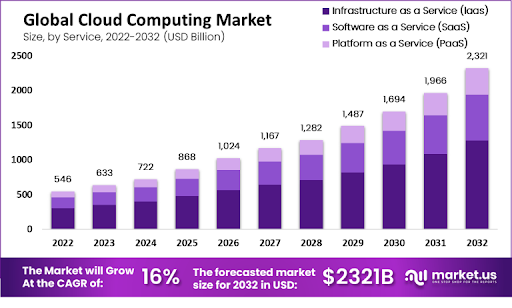Business success highly depends upon the app’s performance. When an app is optimized, it ensures user satisfaction.
Although app development companies are ensuring high-quality practices to ensure the optimization of applications, it has become a challenge for them when it comes to ensuring cloud app optimization.
However, experienced cloud app developers deploy certain practical tips to businesses that maximize optimization over the cloud.
So, what is cloud optimization? How can businesses ensure cloud optimization with popular cloud service providers like AWS, GCP, and Azure? Let us find out in this blog.
Table of Contents
Understanding Cloud Optimization
For businesses planning to migrate to cloud infrastructure or want to optimize it, understanding cloud optimization as a term is important.
Cloud optimization, as the name suggests, is fine-tuning the cloud infrastructure to maximize the efficiency and performance of applications. It also consists of addressing issues such as the latency of the cloud, cloud security optimization, and optimizing the costing of cloud resources.
Popular service providers like Microsoft Azure, Google Cloud Platforms, and Amazon Web Services have their own implications of practical tips for optimization. We will explore that in later sections.
Why is Cloud Optimization Important For Your Business?
Ludmila Morozova-Buss, an IT expert at Capitol Technology University (Maryland), quotes, “Efficiency and savings can be achieved, given that attention is paid to cloud cost optimization.” Forever, business efficiency and savings remain top targets. Here are some more pointers explaining the importance of cloud optimization in detail for your business.
When You Optimize, You Improve Visibility
There are various cloud service providers who offer you the best services. However, if you do not apply the filter of optimization while using these services, you will pay more in terms of resources and money. With a cloud optimization strategy, you unlock dynamic visibility across your cloud services.
Cloud Optimization Targets Cost Efficiency
Look at the below chart posted by market.us in their cloud computing research.

By 2032, the cloud computing market will exceed $2321 billion, achieving an annual growth rate of 16%. However, businesses that focus on cloud optimization techniques will unlock cost efficiency, i.e., maximizing their resources within the lowest budget. With this, they can make the right investment.
Improves Cloud Engineers’ Productivity
With a clear strategy for cloud optimization, cloud app development companies have clear visibility into what and how you want things. This in turn leads to higher productivity for your cloud engineering partner.
Fostering Innovation in your Business
The number of businesses with an optimized cloud app strategy is lower as compared to the total number of cloud-ready businesses. When you focus on cloud innovation and optimization, your organization fosters innovation, making you a leader in the market.
Common Challenges to Cloud Optimization
Before talking about cloud optimization tips, it is important to discuss the common challenges involved in cloud optimization.
Network Latency Challenge
Since cloud computing allows remote access to applications and their data, network latency becomes a challenge. The data must travel geographically to reach the devices of the user. Hence, it becomes challenging for businesses to optimize their cloud infrastructure in terms of network latency.
Downtime Challenge
With massive amounts of data stored on cloud platforms, overloading the data requests can lead to downtime. Service disruption is likely possible, and it takes efforts to optimize the downtime to provide a seamless experience to the users.
Cost Management Challenge
The pay-as you go model reduces the overall cost, but there are times when organizations get to know about the huge costs incurred in the long run. Identifying Unused resources
Data Loss Challenge
Another common challenge related to cloud optimization is the data loss challenge. How can we optimize the cloud platforms in such a way that the chances of data loss are minimal?
Read More: Biggest Mobile App Development Challenges To Tackle For 2024 (With Solutions)
Cloud Optimization: Practical Tips for Azure, GCP and AWS
Here are some practical tips on cloud optimization from the leading service providers. Whichever cloud infrastructure you are using, you can read the below tips to achieve cloud app optimization.
Microsoft Azure
- Azure Advisor: Leverage Azure Advisor for performance recommendations.
- Cost Management: Use Azure Cost Management to optimize costs efficiently.
- Azure Autoscale: Implement Azure Autoscale for dynamic resource allocation.
- Azure CDN: Explore Azure CDN for accelerated content delivery.
Google Cloud Platform (GCP)
- Google Cloud Operations Suite: Utilize Google Cloud Operations Suite for monitoring and diagnostics.
- Preemptible VMs: Take advantage of GCP’s Preemptible VMs for cost-effective computing.
- Cloud Load Balancing: Implement Google Cloud Load Balancing for efficient traffic distribution.
- Cloud Storage Classes: Utilize cloud storage classes to optimize storage costs.
Amazon Web Services (AWS)
- AWS Trusted Advisor: Employ an AWS Trusted Advisor for best practices and cost optimization.
- AWS Auto Scaling: Implement AWS Auto Scaling for dynamic resource provisioning.
- Amazon CloudFront: Leverage Amazon CloudFront for content delivery acceleration.
- Elastic Load Balancing: Explore AWS Elastic Load Balancing for efficient workload distribution.
- Tools and Technologies for Cloud Optimization: Utilize performance monitoring tools, automation solutions, content delivery networks (CDNs), and embrace containerization and microservices architecture for optimal cloud performance.
Stay Updated With Future Cloud Trends
With cloud optimization practices, do not forget to keep up with the latest cloud computing trends. These trends will help you find out what is going on in the cloud industry. For example, the inclusion of AI in cloud platforms has opened a new race for businesses to make their cloud infrastructure intelligent. Trends will also save you from emerging risks in the future that might disrupt or affect your cloud strategies.
How Can RipenApps Help you Optimize your Cloud?
As you finish reading about why there is a need to prioritize cloud optimization with practical tips, let us give you a little information about us.
We are a digital transformation company with a dedicated vertical for cloud app development, along with our multiple service offerings. At RipenApps, we have dedicated cloud engineers who are experienced with all the major cloud service providers, delivering you cloud app development, management, maintenance and support, migration, and optimization services.
FAQs
Q1. How can cloud optimization accelerate app performance?
By optimizing resources such as servers, databases, and storage in the cloud, apps can run faster and more efficiently. This includes scaling resources, leveraging content delivery networks (CDNs), and optimizing code for better responsiveness.
Q2. What are some common challenges to app performance that cloud optimization addresses?
Cloud optimization addresses challenges like slow load times, high latency, and more. It helps mitigate these issues by analyzing workloads effectively, reducing latency, and ensuring the right amount of resources are allocated.
Q3. How do I choose the right cloud service for optimal app performance?
Evaluate your app’s requirements and choose a cloud service provider that aligns with your needs. Consider factors like geographical presence, available services, scalability options, and performance monitoring tools to make an informed decision.
Q4. How often should I review and update my cloud optimization strategy?
Regularly review your cloud optimization strategy, especially when there are changes in app usage patterns, new features are introduced, or updates to cloud services occur. Continuous monitoring and adjustments are essential for maintaining optimal cloud performance.












 India
India USA
USA Australia
Australia Canada
Canada UK
UK UAE
UAE